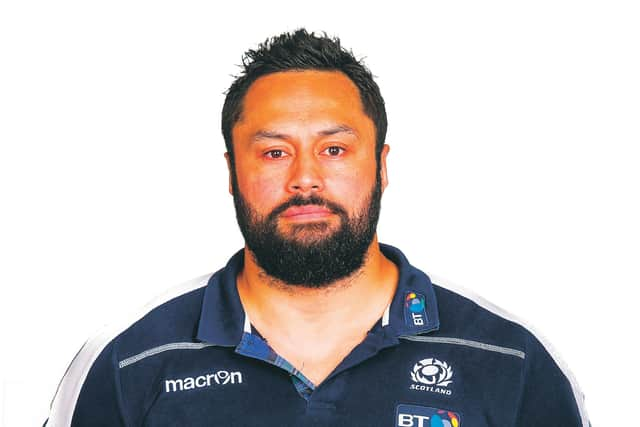Ben Atiga on Rory Sutherland’s gruelling return to fitness and Scotland duty


It has been a difficult time but optimism is always the best policy and there is plenty of it to be found. The case of revitalised Scotland loosehead prop Rory Sutherland emerging from a “dark place” is a perfect example.
Lockdown has been a, let’s hope, once in a lifetime experience of worry, confusion and, occasionally, despair. But the world of sport has been admirable in the past weeks in the way it has addressed mental health issues, which is a subject often neglected in a sphere of life which is associated with youthful confidence, vitality, skill, fitness and, sometimes, a bit of bravado.
Advertisement
Hide AdAdvertisement
Hide AdSutherland’s journey over a harrowing few years should be a lesson to everyone that light is always at the end of the bleakest tunnels.


Four years ago the 27-year-old from Hawick was learning how to walk again after a horrific freak injury derailed his career. This year he was back in the Scotland front row and was arguably one of the team’s stand-out performers in the curtailed Six Nations, playing in all four games against Ireland, England, Italy in France and part of a noticeably impressive and improved Scottish scrum unit.
During that Six Nations campaign Sutherland spoke openly about the unforeseeable injury which brought his career to a sudden standstill back in 2016.
“I had a bilateral groin reconstruction,” he explained. “Both my adductors [upper thigh muscles] came off the bone so I had to get them reattached and screwed into the bone again. I was flat on my back for three months.
“It was the start of the 2016-17 season, maybe five games in, and I was just warming up and it was a freak accident.
“I had been getting problems with my groin for about a year beforehand and I went to sprint in the warm-up and one of my tendons was frayed so it snapped, and because I was sprinting it put so much stress on the other side that that came off as well.”
As you can imagine, a difficult period lay ahead for the player known to his team-mates as “Suz”. And that’s when Ben Atiga, the SRU’s player liaison officer since March 2018, comes into the story.
The former Edinburgh centre said: “Rory was the first case study for me. He was the one that really ignited this whole push to have a programme in place.
Advertisement
Hide AdAdvertisement
Hide Ad“It really was just getting next to Suz and working through Plan A and Plan B. What happens if his surgery did come right and what happens if it didn’t.
“Players just need to know that someone cares about them, that someone is thinking of them. We’re all human. It’s not a macho thing to ask for help.”
Sutherland experienced a slow and frustrating path back to doing what he loves but now has seven caps to his name and has laid down a marker that he is a player who could keep hold of that No 1 Scotland jersey for a while to come.
“Giving it up wouldn’t have been an option,” he insisted. “I would have stopped if I had to but I would never have given up trying to get back to playing rugby. When I went through that time of my life it was very hard to wake up every day and have that, sort of, drive to want to play again. It was a lengthy old process.
“I went three months of pretty much not being able to move at all to give the operation the best chance to heal. A really long rehab period of teaching my body the mechanics of walking, running again. Doing all those things, and then a slow transition into being able to train to play again.”
Atiga, pictured inset, takes up the story of his involvement with Sutherland’s recovery. “It was a chance encounter that started it all,” said the former Edinburgh and All Blacks centre, who now acts in a pastoral role for Scotland’s professional rugby players. “I ran into him in a car park, and you could just see it on his face that he wasn’t his chirpy self. You could get a gauge of how he was feeling.
“I got next to him, worked with him for a couple of months through the surgery. It was really about making sure we were touching base with him on a regular basis, and that he knew there was someone outside of the player group and performance group where he could just let loose and get everything out in the open.
“From there, he led the rest of the way through his own resilience that he’d built by coming out of that dark place. There are cases that aren’t as serious as it got for Suz, but there are guys who do struggle.
Advertisement
Hide AdAdvertisement
Hide Ad“It can get flagged up by someone in one of the medical teams referring something on to me. If there is further support that the player needs – if it’s beyond anything I can offer in a normal conversation – that’s when we signpost them to our medical provider. Those systems are in place.”
A message from the Editor:
Thank you for reading this story on our website. While I have your attention, I also have an important request to make of you.
With the coronavirus lockdown having a major impact on many of our advertisers - and consequently the revenue we receive - we are more reliant than ever on you taking out a digital subscription.
Subscribe to scotsman.com and enjoy unlimited access to Scottish news and information online and on our app. With a digital subscription, you can read more than 5 articles, see fewer ads, enjoy faster load times, and get access to exclusive newsletters and content. Visit https://www.scotsman.com/subscriptions now to sign up.
Our journalism costs money and we rely on advertising, print and digital revenues to help to support them. By supporting us, we are able to support you in providing trusted, fact-checked content for this website.
Joy Yates
Editorial Director
Comments
Want to join the conversation? Please or to comment on this article.